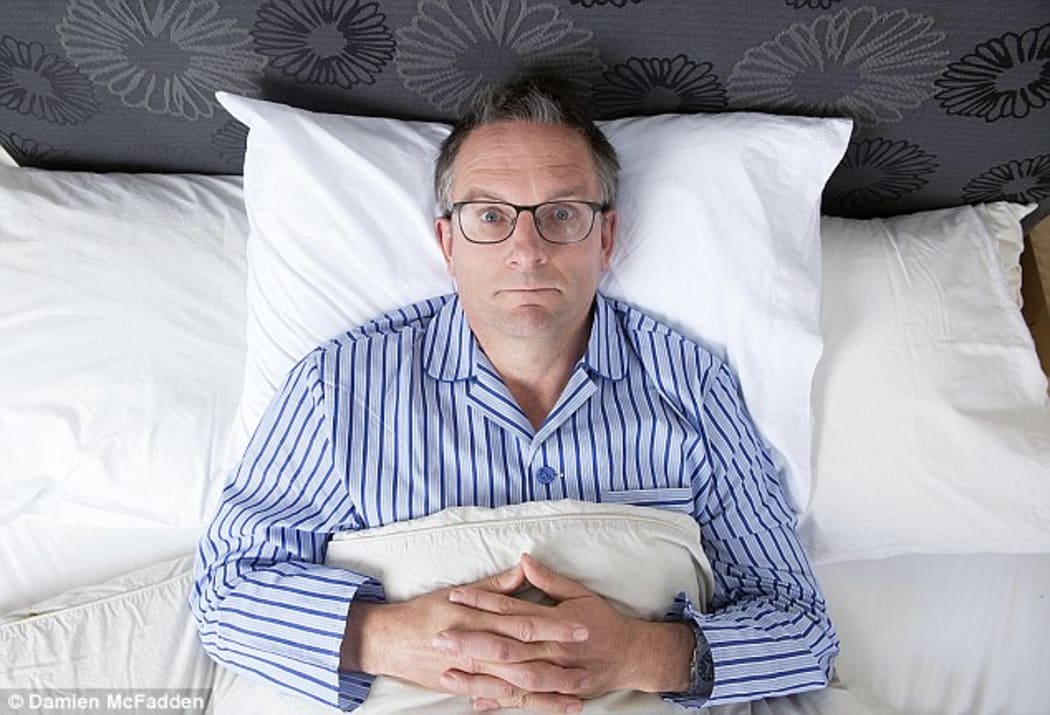"The sleep industry is huge and most of the things they flog do not work" – Michael Mosley, science journalist, gut specialist and author of the new book Fast Asleep.

Photo: Damien McFadden
Michael Mosley tells Kim Hill he didn't want to write a book about sleep until he had some helpful solutions - and that time is now.
"Everything I've written about I have tried and I'm delighted to say I'm no longer an insomniac."
Sleep is profoundly important for the immune system, says Mosley, who wrote Fast Asleep before the Covid-19 pandemic.
As we get older, our immune system tends to decline, he says, partly because we miss out on the helpful substances that our body produces during deep sleep.
These include cytokines – a type of protein that acts as our first line of defence when a virus such as Covid-19 invades.
"What happens in old people [who get coronavirus] is if they don't mount a good enough immune response early on then they grossly overact, and you get this thing called a cytokine storm where the cytokines and all sorts of things go a bit crazy. At that point, the virus is in your lungs and your body launches, effectively, a nuclear attack on the virus. But by that point, the immune response is so destructive that it basically knackers your lungs."
"Enough" sleep is different for different people, so how do we know if we're getting the amount our individual body needs?
The best test we have of whether or not someone is getting enough sleep is whether they fall asleep during the day, Mosley says.
If you're unsure, he suggests getting into bed mid-afternoon and setting your alarm for 15 minutes.
"If you fall asleep within 15 minutes you have a problem – you are sleep deprived."
So then what?
Mosley recommends creating a pattern of getting up at the same time every day. Then, first thing in the morning, expose yourself to plenty of bright light to reset your circadian clock.
Eating a Mediterranean-style diet rich in fibre and legumes can be helpful. It's good for gut bacteria and will also help reduce stress, anxiety and inflammation in the brain.
Also melatonin – which you can buy online as a vitamin supplement – is worth investigating.
"There have been numerous studies that have shown melatonin – particularly over the age of about 55 – improves the quality of sleep. It seems to have almost no side effects and you don't get habituated to it like you do sleeping pills."
If you want or need to go further, Mosley suggests "rebooting your brain" with sleep restriction therapy.
"You've got used to the idea that when you go to sleep you will wake up and you will fret about it – and this is a way of breaking that cycle."
Sleep restriction is currently the most effective treatment for insomnia we know of – more effective than medication – yet it's surprisingly little known outside of "sleep circles", he says.
The idea is to teach your brain to associate bed with sleep by limiting the time you spend in bed to six or seven hours a night.
If you usually spend 8 hours in bed, cutting that down to 6 hours a night for one week (with no afternoon napping) should massively increase your sleep drive, Mosley says.
"If by the end of the week you're getting your 6 hours of solid sleep then you can increase it by 20 minutes and do that for another week. Then gradually increase it."
If you wake in the night and don't feel sleepy, he recommends getting up and reading until you do.
If you feel sleepy-ish, breathing exercises can be very effective in getting you back to sleep, he says.

